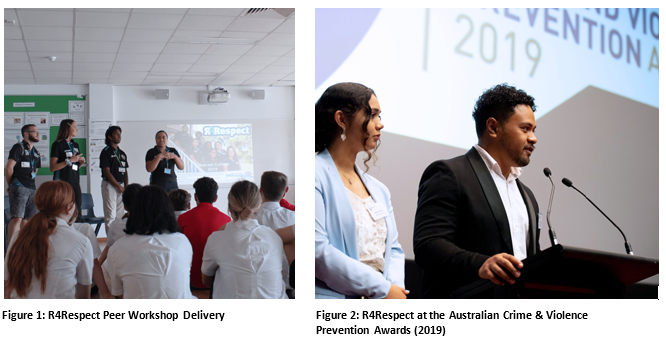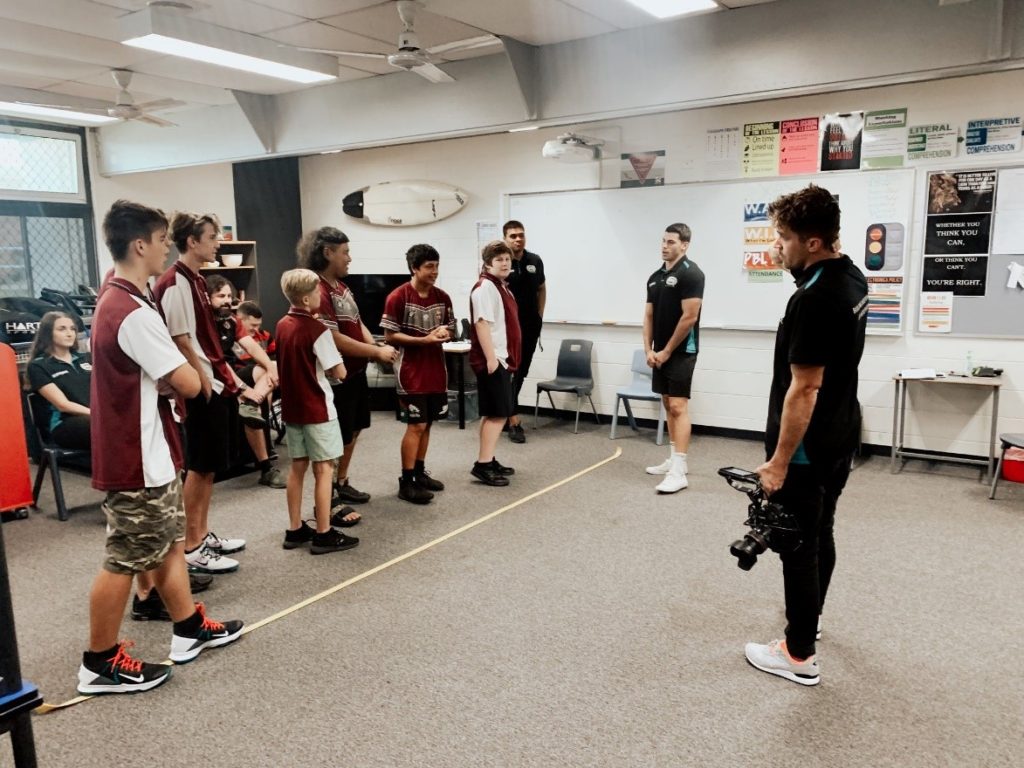R4Respect: How can we possibly teach young people – especially young men – accountability, respect and sexual consent, when our legislation doesn’t?
Response to QLRC Report on Consent and Mistake of Fact Defence
R4Respect Youth Ambassadors, YFS Ltd.

Since September 2015 R4Respect have engaged more than 5,000 young people face to face in Queensland about respectful relationships and what constitutes sexual consent. As peer educators working on-the-ground we have seen first-hand the pervasiveness of harmful community attitudes around women, sex and consent and how these heavily engrained beliefs enable family violence and sexual violence very early on in people’s lives.
We know that leaving dangerous misconceptions unchecked and unchallenged is problematic and harmful. We know that we cannot challenge the status quo alone through peer education, our efforts must be backed up by forward thinking legislation and strong leadership by our State Government. We recognise and commend Attorney General Yvette D’Ath and the Queensland Government for making important strides in strengthening laws to reduce violence against women and supporting our program.
As young agents of social change in our communities, we rely on our legal system to establish an important precedence – a precedence that is fair, delivers adequate justice to victims and holds perpetrators to full account by the law. As it stands, the law does not provide this. The Commission’s report and its recommendations are a devastating blow for survivors, advocates and for all young Queenslanders, like us, who aspire for a society that listens to women’s voices and experiences of harm.
It is evident that these “reforms” are not trauma informed and ignore the voices of survivors and advocates. We are calling on Attorney General Yvette D’Ath to address the failures of this report immediately and listen to survivors and Queensland’s frontline services. R4Respect supports the draft amendments proposed by Women’s Legal Service Queensland (WLSQ) and the Rape and Sexual Assault Research and Advocacy Group (RASARA). Following our submission and attendance of a four-hour-long ‘consultation workshop’ in February with 37 other stakeholders, 11 of which were survivors of rape or sexual assault, we find the Queensland Law Reform Commission’s report and its five recommended changes to change QLD’s sexual consent laws extremely disappointing on numerous fronts – here’s why.
What do the QLRCs recommendations suggest?
The report’s first three reforms covering the definition of consent legislates what are ‘already well-established principles in law’ says Dr Jonathan Crowe, Professor of Law at Bond University. The insertion of a few ‘buzz words’ into the law to give off the impression of progressive change means little to no difference in the way it operates legally. Under these ‘reforms’, being passive (e.g. not fighting back or not clearly saying no) can still amount to consent in some cases. This is unacceptable and not in line with community standards around consent.
Crowe says that “the proposals do nothing to strengthen the law on sexual consent, nor do they address the problems that prompted the review in the first place.” Survivor-Advocate Saxon Mullins also said that the Commission’s recommendations were a “slap in the face to survivors”.
“The commission does not consider that section 348 [the definition of “consent”] should be amended to give effect to an ‘affirmative consent’ model.” Affirmative consent means putting the onus onto the person who is initiating sex to ensure that consent exists and makes steps to ascertain if the other person is comfortable. An affirmative consent model was one of three suggestions R4Respect put forward in our submission to the Commission in January, in agreeance with legal experts, survivors and women’s legal services who all suggested Queensland should adopt the Tasmanian model.
The Tasmanian model mandates affirmative consent by legislating that the courts must consider steps the defendant took to gain consent, and not focusing solely on the actions of the victim – an important step away from the centuries-old victim blaming rhetoric. The Tasmanian model has been in place for 16 years without controversy (Lynch, 2020). The proposed QLD reforms do not mandate courts to consider this.
R4Respect believes this a huge missed opportunity by the Commission and our State Government to listen to survivors and bring sexual consent laws into the 21st century.
The fourth and fifth reforms addressing the ‘mistake of fact’ defence are of huge concern. This defence is used when the accused has ‘reasonable belief’ the victim was consenting. It’s often used when a survivor goes through a ‘freeze’ trauma response during their assault or rape, but the report and its recommendations makes no effort to address this issue. Defendants are more likely to use this excuse if the victim ‘froze’ during the assault to avoid conviction (Crowe, 2020). The excuse is also problematic as it leaves the onus of proof on the victim to ‘fight off’ an attacker.
We saw this exact loophole in the law fail survivor Saxon Mullins in the NSW jurisdiction; her perpetrator believed her silence and lack of resistance equalled consent. Mullins’s physical injuries and ‘freeze’ response were consistent with trauma associated with rape. The courts labelled Mullins’ account of her own trauma ‘unreliable’. Her perpetrator was later acquitted of rape using the mistake of fact excuse (Miligan, ABC News 2018).
At the QLRC consultation in February R4Respect voted unanimously alongside 37 survivors and legal experts, including Saxon Mullins herself, to remove the mistake of fact excuse where survivors were asleep, unconscious, or heavily intoxicated (and that a perpetrators drunkenness cannot be used in their favour).
The report fails to discuss the collective concern expressed in that meeting, and again, the proposals do nothing to change this.
Report claims “rape myths are declining” – but Australian-based data show this is not the case
The QLRC’s report misleading claims that “rape myths are declining” are of particular concern to us, given the 2017 National Community Attitudes Survey (NCAS) revealed that:
- 1 in 3 young people believe that often, women who were raped had led the man on and then had regrets
- 1 in 8 young people support the statement, “If a woman is raped while she is drunk or affected by drugs, she is partly responsible”
- Over 1 in 4 young people think that when a man is sexually aroused, he may not even realise the women doesn’t want to have sex
These are the very real rape myths R4Respect works to challenge daily with young people in the classroom. Research into our peer education commissioned by The Australian National Research Organisation for Women’s Safety (ANROWS) and Griffith University in 2019 also showed that increased work with young men is necessary to address alarming trends in attitudes’ around consent, women and gender equality. The overwhelming evidence from the ANROWS research and the 2017 NCAS Survey prompted us to start a program specifically targeting young men with harmful attitudes.

Figure 3: Our brother program Men4Respect working with young men on ‘drawing the line’ between HARMFUL and OK behaviour towards women.
We worked with ANROWS and VicHealth to communicate the findings of the 2017 NCAS Youth Report. You can view the NCAS key findings on consent here:
We cannot continue to ignore rape myths that permeate all aspects of our society, including our judicial system.
How can we possibly teach young people – especially young men – accountability, respect and sexual consent – when our legislation does not?
If you or someone you know needs support reach out to:
Sexual Assault Helpline on 1800 010 120
DVConnect Womensline (Queensland) on 1800 811 811
DVConnect Mensline (Queensland) on 1800 600 636
References
- Crowe, Jonathan (2020). “Queensland rape law ‘loophole’ could remain after review ignores concerns about rape myths and consent” 4 August 2020. Available at: https://theconversation.com/queensland-rape-law-loophole-could-remain-after-review-ignores-concerns-about-rape-myths-and-consent-141772?fbclid=IwAR2S40fUA_fVx1bpIiS5XHfd53Ysptkm95gMJnrQy772wBySKBozLTrNrJ8
- Lynch, Lydia (2020) “Rape survivors say new sex consent laws are a slap in the face”, Brisbane Times, 13 August 2020. Available at: https://www.brisbanetimes.com.au/politics/queensland/rape-survivors-say-new-sex-consent-laws-are-a-slap-in-the-face-20200813-p55lf6.html?fbclid=IwAR0Fc8Pm5Kk67my4qkL9SV6iTJIqdL2DwSrWoFLbJBQ4of7Sb55B4uJYzwA
- Miligian, Louise (2018). “I am that girl”, Accessed via http://www.abc.net.au/news/2018-0507/kings-cross-rape-case-that-put-consent-on-trial/9695858
- Politoff, V et al (2019). Young Australians’ attitudes to violence against women and gender equality: Findings from the 2017 National Community Attitudes towards Violence against Women Survey (NCAS) (ANROWS Insights, Issue 01/2019). Sydney: ANROWS. Available at: https://d2rn9gno7zhxqg.cloudfront.net/wp-content/uploads/2019/12/05051743/2017NCAS-Youth-SubReport.pdf
- Struthers, K., Parmenter, N., & Tilbury, C. (2019). Young people as agents of change in preventing violence against women (Research report, 02/2019). Sydney, NSW: ANROWS. Available at:
- Queensland Law Reform Commission (2020). “Review of consent laws and the excuse of mistake of fact” Report no.78. Available at: https://www.qlrc.qld.gov.au/__data/assets/pdf_file/0010/654958/qlrc-report-78-final-web.pdf
- Queensland Women’s Legal Service (2020). “Sexual assault review recommendations: A step in the right direction but do not go far enough says Women’s Legal Service”, 2 August 2020. Available at:https://wlsq.org.au/sexual-assault-review-recommendations/
- Queensland Government (2020). “YFS delivers R4Respect, a DV prevention model”, Community Implementation Plan, Women’s Strategy, 30 March 2020. Available at: https://www.csyw.qld.gov.au/campaign/womens-strategy/success-stories/yfs-delivers-r4respect-dv-prevention-model